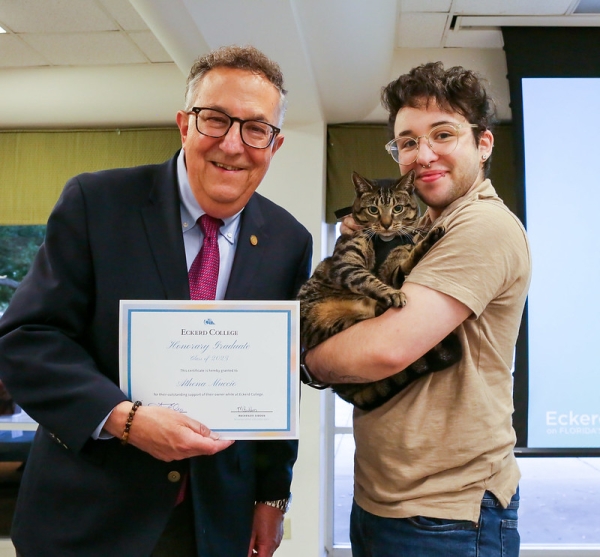You have /5 articles left.
Sign up for a free account or log in.

Small liberal arts colleges have adopted pet-friendly campus policies to help address mental health concerns among learners and boost enrollment.
Nazar Rybak / E+ /Getty Images
Moving off to college doesn’t mean you have to leave the family dog behind, at least at some institutions. Starting this fall, students at Warren Wilson College in North Carolina can bring dogs, cats, rabbits, birds and more into the residence halls.
Administrators hope the new policy not only addresses student health and wellness concerns, but also helps recruit animal-loving learners.
“By allowing students to bring pets from home, we hope to provide a sense of home and companionship,” Dean of Students Tacci Smith said in a news release from the college. “It will help alleviate anxiety and homesickness that students can sometimes feel.”

Students can bring one dog or a medium-sized pet (cat, rabbit, large bird, ferret, iguana, nonvenomous snakes and chinchillas) or two small pets (fish, small birds, rats, hedgehogs, hamsters, gerbils, guinea pigs and small reptiles).
The college will dedicate special residence halls for medium pets but small pets can live in any dorm.Warren Wilson College
What’s the need: Over half of students experienced some kind of homesickness in fall 2023, with 11 percent feeling homesick often, according to data from EdSights. Students who feel homesick are less likely to persist, compared to their peers.
Inviting pets to campus is a growing enrollment strategy to attract students to residential campuses, and many of the pet-friendly institutions are small, private liberal arts colleges.
While all colleges must allow service animals for students with accessibility needs and accommodations, comfort animals have also increased on campuses to meet student mental health needs following the COVID-19 pandemic.
Wagging tails at Warren Wilson: Students who wish to bring a pet from home will live in one of the animal-friendly residence halls at Warren Wilson, and for those who are not interested in having a furry roommate, there will be pet-free halls available as well.
In addition to dogs, cats, rabbits and birds, students can bring their chinchillas, ferrets, iguanas, fish, hedgehogs, hamsters, gerbils, guinea pigs, rats and nonvenomous snakes or reptiles. All animals must be established family pets—have resided with the student prior to transitioning to campus.
To accommodate for space constraints in student housing, the college will enforce size restrictions on dogs, snakes, fish tanks and terrariums. Individuals are limited to one dog or medium-sized pet or two small pets per residence hall room.
“The policy is also about making sure the pets are comfortable living on campus,” Smith said. “We wouldn't want an animal to have anxiety of living in a new, small place.”
Warren Wilson does not a have a cap on the total number of pets that can live on campus, but based on a student survey, administrators anticipate around 100 existing students will bring animals to campus.
“We hope that some students may decide to come to Warren Wilson because of the new policy,” Director of Communications Mary Bates says.
All students wanting to bring a pet to college must register the animal with Pet Life (a subdivision of the Housing and Residence Life Department), which is made up of staff as well as pet-free and pet-owning students. Established this past fall, Pet Life is responsible for administering policy and staff members manage fines and budgets. The team consists of the college’s veterinary science professor, a local veterinarian, the dean of students, residence life staff and four pre-vet students.
Pet owners can also expect to pay an annual fee depending on the type of animal they own, ranging from $50 for a rat to $250 for a dog (and slightly lower fees for summer sessions).
Still missing Fido but not ready to commit to dorm life with a dog? Students can also register their family animal as a Visiting Pet to reside on campus overnight for up to 3 consecutive nights, giving them a taste of home away from home.
College for Marley and me: While having animals in the residence hall is a benefit to the individual student and their comfort, pets can also become a distinct element of the campus experience.
Eckerd College, one of the oldest examples of a pet-friendly campus, has a pet graduation each spring, which awards pets a diploma presented by the president and religious experiences for the fuzzy friends, including a pet blessing with the Feast of St. Francis of Assisi and a bark mitzvah.
Stephens College offers doggy treats in the president’s offices and holds a pet costume parade over Halloween and offers pet-specific facilities, including a dog wash and Doggy Daycare for students to use.
Warren Wilson will create a pet park and pet events for owners and animals to enjoy starting this fall, funded through the pet fee.
Seeking stories from campus leaders, faculty members and staff for our Student Success focus. Share here.
This article has been updated to correct all references to the university as Warren Wilson.










